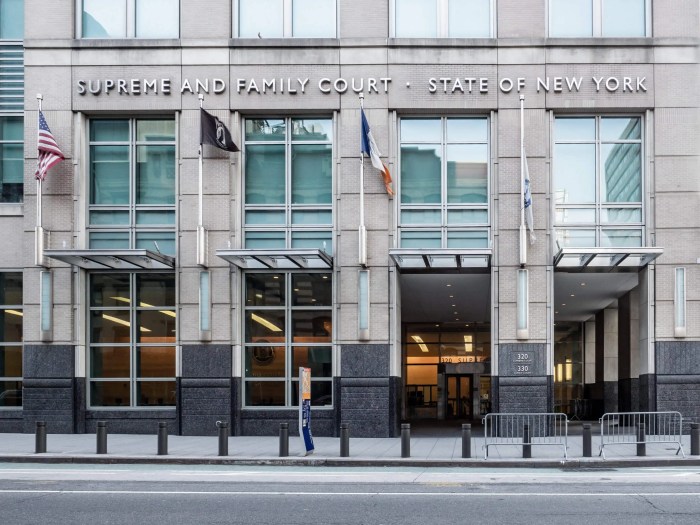By Julie Shapiro
Relief could be on the way for Battery Park City homeowners facing steep tax hikes.
Over the next two years, residents at 11 B.P.C. buildings are slated to pay up to $300 more each month in ground rent. Worried that the spike will force people out of the neighborhood, the 11 buildings recently presented a plan to the Battery Park City Authority to mitigate the increase.
As recently as a year ago, B.P.C.A. President Jim Cavanaugh said there was no need to alter ground rents in the 11 buildings. But this week Cavanaugh called the planned increases “a problem.”
“We are determined to work cooperatively for a solution,” Cavanaugh told Downtown Express Monday. He added, “Affordability is important to us.”
Bill Thompson, who just became Gov. Paterson’s first appointee to the authority board, also cited the importance of neighborhood affordability in his confirmation hearing two weeks ago.
The 11 buildings in the deal under discussion are: the Soundings, Liberty Court, Parc Place, Hudson Tower, Hudson View East, Hudson View West, Hudson Tower, River Rose, Liberty House, Liberty Terrace, Battery Pointe and Cove Club.
The ground rents, a fee residents pay in addition to the equivalent of property taxes, were set decades ago based on negotiations between developers and the authority. The ground rents vary widely from building to building, but all have built-in increases after 25 and 40 years. Many buildings are about to hit the 25-year mark, and some residents who are paying only $30 a month will soon pay $300, while others who are paying about $200 a month will soon pay $450.
Then, in another 15 years, all of the ground rents will go up to 6 percent of market value, which would be well over $1,000 a month for many homeowners based on today’s values.
“Some of the increases are absolutely staggering,” said Anthony Notaro, one of the residents leading the negotiations. “It would literally destroy this neighborhood.”
Cavanaugh said the deal under discussion would spread the imminent rent spikes over 15 years rather than having them hit residents all at once. The plan, which has the support of Assembly Speaker Sheldon Silver according to several sources, would also mitigate the next wave of increases that will start around 2026.
Cavanaugh said the authority has not taken a position on the proposal. The authority’s real estate consultants are almost finished reviewing the proposal, and then Cavanaugh said he would meet with Silver and the residents.
Silver declined to comment, citing the pending negotiations.
A key voice in the ground rent discussions will likely be Thompson, the former comptroller and mayoral candidate who is expected to become chairperson of the authority board on March 29. In comments to a State Senate committee last month, Thompson suggested that he is open to renegotiating the ground rents.
Cavanaugh said he has not discussed ground rents with Thompson but plans to raise it when the two meet later this week. Thompson has declined interview requests since being confirmed.
This would not be the first time the authority offered relief on ground rent. Last year, the authority agreed to spread out planned increases at the Liberty View and the Regatta, where rents were slated to go up to about $1,500 a month and $2,200 a month, respectively. (The Cove Club participated in those discussions as well but was dissatisfied with the authority’s solution, so the Cove Club is one of the 11 buildings now negotiating with the authority.)
At the time of last year’s deal, Cavanaugh said the Liberty View and Regatta presented a unique case because they were already paying more rent than other buildings in the neighborhood, even before the increase. Cavanaugh said back then that the authority was not planning on renegotiating ground rents at the other buildings in the neighborhood, where some residents are now paying as little as $30 a month.
This week, though, Cavanaugh sounded much more amenable to mitigating the increases at the 11 buildings, especially the increases that are scheduled for 2026 and 2027. Those 40-year rent resents will bring ground rents at all 11 buildings to 6 percent of market value, which “will be very significant,” Cavanaugh said.
“We want to deal not only with what might happen in two years, but also what might happen in 17 years,” Cavanaugh said.
The residents’ plan would use a lower percentage than 6 percent of market value to calculate the rent resets that start in 2026, Cavanaugh said.
While 2026 may sound far away, banks giving out 30-year mortgages are already taking ground rents into account, and Notaro said people may have trouble getting loans if the authority doesn’t step in. Notaro is also worried that longtime residents won’t be able to pay the higher fees and could have to leave the neighborhood.
Although all condo owners should have known about the planned ground rent increases when they bought their condos — and they likely got a better price to make up for the ground rent — many people were surprised by how quickly property values have risen, with the ground rents following behind, Notaro said.
Notaro lives in Liberty Terrace, where the average ground rent would go from $34 a month to $310 a month in 2012 on top of the real estate taxes. In another 15 years, the rent would jump to $1,500 a month based on today’s values.
“We know we’re getting an increase,” Notaro said. “The question is how do we make the increase bearable, and how do we make that fair.”
Julie@DowntownExpress.com













